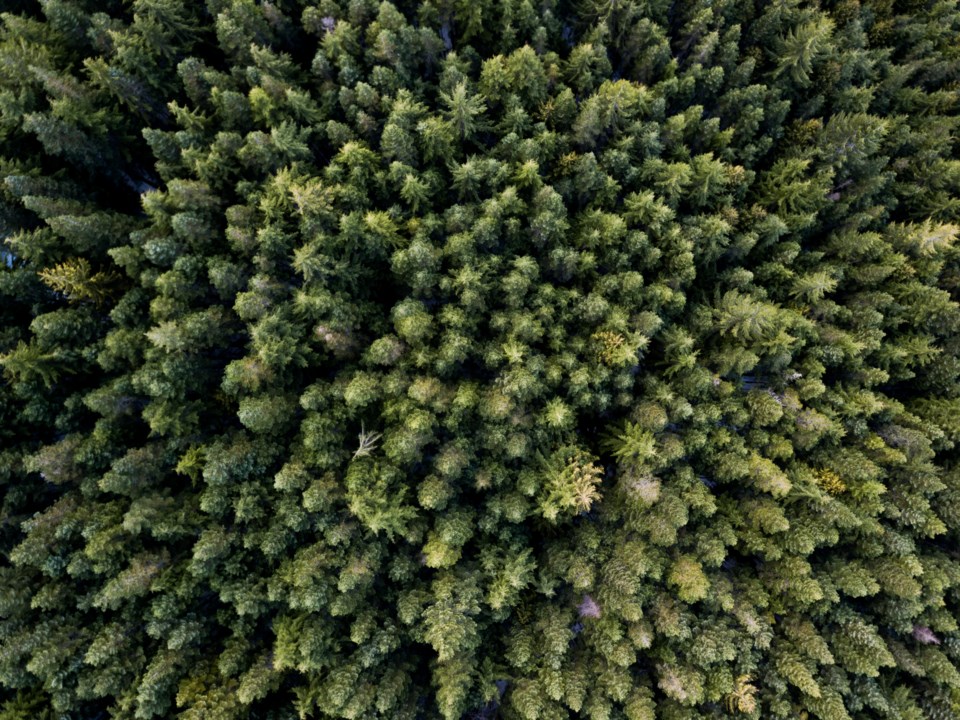The forests around Squamish, once heavily logged, will soon see a reduction in timber harvesting as the province’s deputy chief forester reduces the allowable annual cut (AAC) for Tree Farm Licence 38 (TFL 38) by 53%.
The new limit of 117,500 cubic metres is still higher than the average annual harvest of 72,000 cubic metres but marks a significant shift towards sustainable forestry, according to Sxwixwtn, Wilson Williams, Squamish Nation spokesperson and council member.
He said he sees this reduction as as a necessary step.
“This 53% reduction from the previous AAC is an important step toward restoring a healthy ecosystem in our territory,” Williams wrote in an email to The Squamish Chief.
Williams stressed that the reduction addresses long-term damage.
“The future generations can be assured that this is the first step towards maintaining and restoring a healthy ecosystem from what remains after heavy industrial resource extraction over the last 100-plus years,” he said.
In an Aug. 29 press release, the Ministry of Forests said that several factors influenced the decision, including wildlife habitat, terrain stability, cultural resources, and protecting old-growth deferral areas while long-term management strategies are developed.
The new rules allow for most of the timber to be harvested from lower-elevation areas, but limit how much can come from older forests.
Sḵwx̱wú7mesh Nation’s influence in forestry management
“This is not an agreement, but we are working toward co-managing these lands through projects like the Sunshine Coast Forest Landscape Pilot Project,” Williams said.
Ownership of Northwest Squamish Forestry (NWSF), which now manages TFL 38, has allowed the Nation to assert more control over land use. “TFL 38 was previously owned by Interfor, a large multinational corporation that did not have the Sḵwx̱wú7mesh Nation's interests in mind when planning within the TFL,” Williams said.
“The TFL is now owned by Northwest Squamish Forestry, and NWSF is owned by the Sḵwx̱wú7mesh Nation.”
While the AAC determination rests with the chief forester, the Sḵwx̱wú7mesh Úxwumixw (Squamish Nation) has a significant role in shaping forestry practices.
“Although the Nation does not make the final determination on AAC, the Nation effectively influences the determination through both its governmental role and its ownership of the license. This unique arrangement provides the Sḵwx̱wú7mesh Nation with control to plan forest harvesting in alignment with its stewardship values and economic interests.”
“Squamish Nation Indigenous Law and Protocol has influenced the land from the beginning of time, and is heavily ingrained in all plans, strategies, and frameworks that scrutinize the review process for all files, including this determination of the Office of the Chief Forester,” Williams said.
The Nation uses the Squamish Connect portal to review all forestry activities. “Squamish Nation utilizes the squamishconnect.com portal to provide reviews for archaeology, culture, and environmental lenses of all files,” Williams said.
A history of dispossession
According to X̱ay Temíxw Land Use Plan, produced by the Nation, over the past 150 years, the Nation has suffered tremendous economic, political, and social damage due to the influx of settlers into their territory and the exercise of power by federal and provincial governments.
The intrusion of massive numbers of people led to the systematic and illegal denial of access to the Nation's lands and resources. During this time, Indigenous communities were largely excluded from decisions about land use, and their rights were disregarded in favour of industrial development.
As the Sḵwx̱wú7mesh Nation continues to reclaim its role in forestry management, Williams expressed hope for future collaboration with the province.
“The Nation will continue to push for ecological integrity and recovery and maintenance as we have for generations, and over time this will be reflected in future AAC determinations that we hope will be made in a collaborative fashion between the province and the Nation.”
Bhagyashree Chatterjee is The Squamish Chief’s Indigenous affairs reporter. This reporting beat is made possible by the Local Journalism Initiative.



